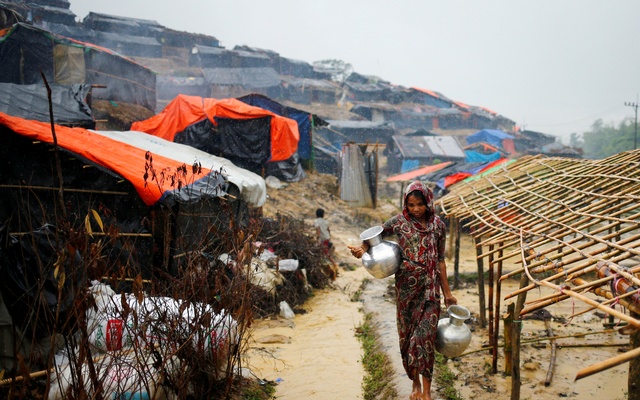News & Updates
Rohingya women and girls in Bangladesh urgently need more funding, urges Oxfam
20 August 2018

Oxfam has found that Rohingya women living in refugee camps in Bangladesh miss out on aid, are developing health problems and are at a greater risk of abuse due to unsuitable or unsafe camp facilities.
As a result, Oxfam is calling for 15% of new funding to be designated to programmes that support Rohingya women and girls in the refugee camps, this includes $72 million of the World Bank’s recent $500 million funding.
There is not currently a budget specifically designated to meeting the needs of women and girls in the Rohingya emergency.
Since August 2017, 700,000 Rohingya refugees have entered Bangladesh from Myanmar, making Cox’s Bazar the world’s biggest refugee camp.
Oxfam and its partner agencies surveyed women in the camp and found that over one third did not feel safe or comfortable collecting water or using toilets and shower cubicles. Approximately half of women and three quarters of adolescent girls said they did not have the necessary items to manage their periods.
For example, many women do not have access to a female only place to wash sanitary cloths.
Consequently, many women are avoiding food and drink to avoid going to the toilet, suffering abdominal pains and infections, and defecating near their shelters, which significantly increases the risk of disease outbreaks.
Dorothy Sang, Advocacy Manager in Cox’s Bazar, Oxfam commented:
“The breakneck speed at which the Rohingya refugee crisis unfolded meant that many emergency facilities were installed in a rush and women’s specific needs weren’t considered. Women and girls are now paying the price in terms of their wellbeing and safety”
“This needs to be rectified urgently with substantial sums set aside to support and protect Rohingya women, such as lighting to improve safety, toilets and wash rooms that provide privacy, and extra assistance for the most vulnerable.”
One in six households in Cox’s Bazar are headed by women whose husbands are dead or missing. These women face other problems as they are forced to assume roles that challenge traditional gender norms and religious assumptions about women.
Oxfam is attempting to overcome the issues uniquely faced by women in the camp by installing solar powered lighting on pathways, running women’s groups to discuss issues such as safety and designing new toilet facilities with lockable doors.
If you’d like to stay informed on the latest updates in aid and development, please sign up for the AIDF newsletter.
Image credit: Reuters